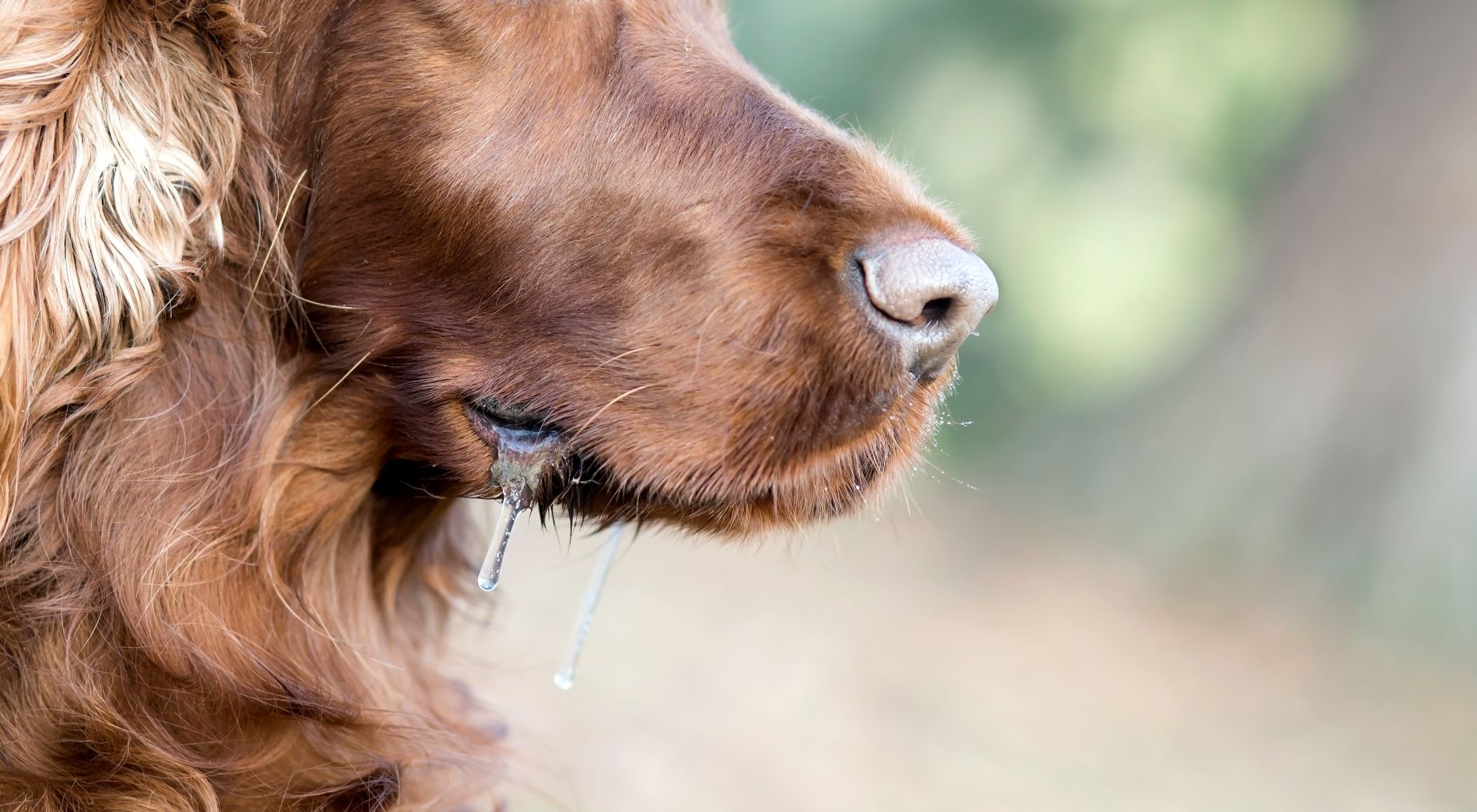
Why Is My Dog
Drooling So Much?
If you’ve noticed your canine companion drooling excessively, you might be wondering, “Why is my dog drooling so much?” While some drooling is normal for dogs, particularly certain breeds known for their slobber, excessive drooling can indicate underlying issues that require attention. Let’s delve into some potential reasons why your dog might be drooling excessively.
Anxiety Or Stress
Lip licking is a behavior dogs use to signal to other dogs and people that they’re uncomfortable or unsure about the current situation.
When your dog licks their lips while drooling, they may be feeling stressed or anxious due to any of these situations:
- Loud sounds, like storms, fireworks, vacuum cleaners, and vehicles
- Travel
- Separation
- The presence of an unknown person
Lip licking and drooling don’t always mean your dog has anxiety. If they do, you may also notice:
- Panting
- Shaking
- Looking away or not making eye contact
- Barking, whining, or whimpering

Age
As dogs age, they become more prone to certain oral health issues such as periodontal disease, oral ulcers, and oral masses. These conditions can cause an increase in saliva production or disrupt the seal around the oral cavity, resulting in more saliva than usual escaping from their mouth. However, aging itself does not necessarily cause drooling.

Oral Health
Oral and dental disorders can affect dogs of any age. Conditions that may cause your dog to drool more include:
- Dental Problems: Dental issues such as gum disease, tooth decay, or mouth infections can lead to increased drooling in dogs. If your dog’s drooling is accompanied by a reluctance to eat, pawing at the mouth, or foul breath, it could signal a dental problem.
- Nausea or Digestive Issues: Dogs may drool excessively when they feel nauseous or experience gastrointestinal upset. This could be due to various factors such as eating something indigestible, dietary indiscretion, or underlying digestive disorders.
- Heat or Stress: Like humans, dogs may drool more in response to heat or stress. High temperatures can cause dogs to pant excessively, leading to increased saliva production. Similarly, stressful situations such as visits to the vet, car rides, or loud noises can trigger excessive drooling as a stress response.
- Poisoning or Toxicity: Ingestion of toxic substances such as certain plants, household chemicals, or medications can cause excessive drooling in dogs. If you suspect your dog has ingested something toxic, seek immediate veterinary assistance.

- Oral Foreign Objects: Sometimes, dogs may drool excessively if they have a foreign object lodged in their mouth or throat. This could be anything from a piece of food to a toy or bone fragment. If your dog’s drooling is sudden and severe, check their mouth for any obstructions.
- Oral Tumors or Infections: Oral tumors or infections, though less common, can also cause increased drooling in dogs. If you notice any unusual lumps or bumps in your dog’s mouth, along with excessive drooling, consult your veterinarian for a thorough evaluation.
- Breed Predisposition: Certain breeds, such as Bulldogs, Mastiffs, and Saint Bernards, are known for their naturally slobbery tendencies due to their facial anatomy and droopy lips. While some level of drooling is normal for these breeds, any sudden increase in drooling should still be investigated.
- Excitement or Anticipation: Dogs may drool in response to excitement or anticipation, such as when they see their favorite toy or treat, or when anticipating mealtime. While this type of drooling is generally harmless, it’s essential to monitor your dog’s overall health and behavior.
While occasional drooling is normal for dogs, excessive or sudden drooling that persists over time should not be ignored. If your dog’s drooling is accompanied by other concerning symptoms such as vomiting, diarrhea, lethargy, difficulty breathing, or changes in behavior, it’s crucial to seek veterinary attention promptly.
Your veterinarian can perform a thorough examination, conduct diagnostic tests if necessary, and determine the underlying cause of your dog’s excessive drooling. Treatment will vary depending on the underlying cause, ranging from dental cleanings and extractions to medication or surgery for more serious conditions.
In conclusion, while some drooling is par for the course for our canine companions, excessive drooling can be a cause for concern. By understanding the potential reasons behind why your dog is drooling so much and seeking timely veterinary care when needed, you can help keep your furry friend happy, healthy, and slobber-free.
Your pets’ happiness and your peace of mind are our top priorities.
Frequently Asked Questions
Some degree of drooling is normal for many dogs, especially breeds with loose jowls. However, excessive or sudden drooling may indicate an underlying issue that warrants attention.
If your dog is drooling more than usual, to the point where it is dripping excessively from their mouth or soaking their fur, it may be considered excessive and should be investigated further.
Providing regular dental care, ensuring your dog’s environment is stress-free, and monitoring their diet for potential triggers can help manage excessive drooling. However, if the drooling persists or worsens, consult your veterinarian for guidance.
Yes, the sudden onset of excessive drooling in dogs can indicate a potential medical problem and should be evaluated by a veterinarian to rule out any underlying issues.
Yes, certain breeds with loose jowls, such as Bulldogs, Mastiffs, and Saint Bernards, are more predisposed to excessive drooling due to their facial anatomy. While this may be normal for these breeds, any sudden increase in drooling should be investigated.
You should consult your veterinarian if your dog’s drooling is accompanied by other concerning symptoms such as vomiting, diarrhea, lethargy, difficulty breathing, or changes in behavior. Your veterinarian can perform a thorough examination to determine the underlying cause and appropriate treatment.